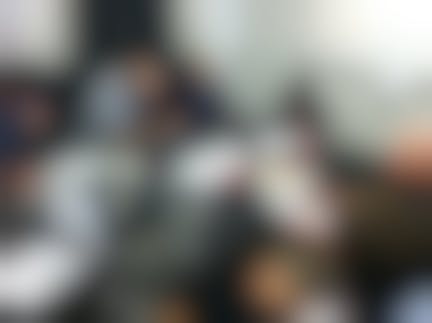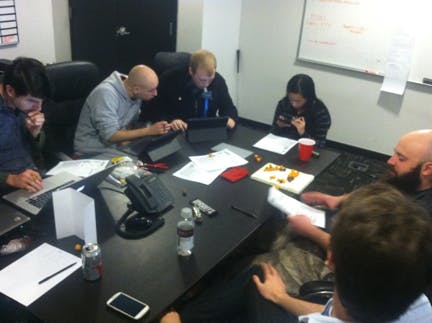
Everything I’ve learned from playing Dungeons & Dragons in the office.
Just over a year ago around quittin’ time I walked over to the printer and jokingly exclaimed that I was printing up a character sheet because I had Dungeons & Dragons that night. I thought the absurdity of the situation was worth a laugh and expected the rest of the staff to laugh at me, but instead one of them got up and said, “Oh yeah, I need to print mine up too.” That was one of the earliest confirmations of something we already knew—that we were nerds super cool people.
We joked about starting our own office D&D group a few times over the next year, but even though we had a few veterans, we didn’t have a seasoned player who was willing to run the game. As the resident project brainstormer and copywriter, I was reluctantly saddled with the heavy task. Hey, being a god is a lot of pressure.
For the layman’s, Dungeon & Dragons is a game of applied imagination. You’re playing within a set of rules that dictate things like how much you can lift, how well you can dodge an attack, and how skilled you are at searching a room for treasure, and you use those skills to navigate a variety of challenges. Drinking Mountain Dew, scarfing down Hot Pockets, and arguing about why the eagles didn’t just fly the Hobbits to Mordor are purely optional.
We now play once a week during an extended lunch every Wednesday, and so far everyone seems to be having a lot of fun, except for me, I get to play the monsters that get killed, and quest givers that get killed, and sometimes innocent bystanders that get killed. No one is safe around this ragtag band of ruffians.
So far, here’s what I’ve learned from playing Dungeons & Dragons in the office:
Sometimes, leaving behind a trail of dead goblins can be cathartic.
Computer programming is an exact science, but it certainly doesn’t always feel that way. Things you think should work often times don’t, and things that you know can’t possibly work sometimes do. It can become tedious, stressful, and exhausting work, and you’re confined to the small space with only the glowing light of a monitor to keep you company while you struggle to meet deadlines and write awesome, bug-free code. Unwinding in the middle of the week can help developers dump all that built up stress, and I sincerely feel bad for any poor traveling wizard that gives a sideways glance at this group of sociopaths out to blow off steam.
Group problem solving skills.
In order to keep the story both gripping and progressing it’s important to build up a larger story to keep the players interested and on track, even while a majority of the time they might be dealing with smaller skirmishes along the way. For these big events it’s good to be inclusive, and build logic puzzles and challenges that test every players’ character, and force them to work as a team to earn the magical loot at the end. This forces people to weigh their own strengths and weaknesses, discuss among themselves, and come up with creative solutions using all of the tools at their disposal as a team. The penalty is the death of their character and being forced to start over, and so far, our little group has come out on top.
Roleplaying social interactions improves communication.
On larger projects in ThoughtLab, especially ones that might last as long as a year or more, disagreements are bound to spring up. Being professional and pleasant are always important, but conveying what you believe is the best course of action for a project is paramount. Giving developers a chance to act out disagreements and how to overcome them and come to a compromise is a skill that takes time, but by roleplaying a disagreement over a fictional problem people can discover how to deal with each person individually, and how best to voice their opinions to the team to have the most effect to make sure things are done right.
Building an open, team environment.
Ultimately our goal is to have fun, and it’s nice to do something social while we eat lunch together. When we started I really didn’t see a benefit outside of a relaxing hour and a half to joke around as we looted dungeons and defeated dragons (and we're still working on that second part). But it’s become somewhat of a weekly ritual that a lot of the team looks forward to, and something that’s become a helpful motivator for me since I have to get to the office early to prepare (I’m not what anyone would call a “morning person”). While we set up, and usually after when we take a moment to level up our characters and divide the treasure by need, we find time to talk about projects, voice opinions, and speak openly in a comfortable relaxed environment, and I think that, more than anything, has helped make us an even stronger team.
Thanks, Dungeons & Dragons.
This article was written in the memory of all the skeletons, goblins, gnolls, and bandits that have given their lives for the betterment of our team.

